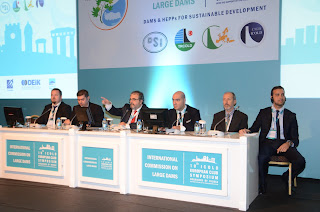The challenge: How big cities have to tackle water scarcity?
Le défi: Comme les grandes villes doivent aborder la rareté de l'eau?
El reto: ¿Cómo pueden afrontar las grandes ciudades la escasez de agua?
World bank organized a workshop in Casablanca (Morocco), on "Water scarce cities" to face the new challenges at the Maghreb. The "Water strategy in theWestern Mediterranean" defined under the political process 5+5 (Portugal, Spain, France, Italy, Malta, plus Libia, Tunisia, Algeria, Morocco and Mauritania) was represented by Enrique Cifres, who dealt with priorities for a "smart policy when facing scarcity due to growth but also to climate change".
His speech dealt with how cities should built its resilience and intelligence for addressing this non futur but current challenge:
A city which faces water scarcity in a smart way:
- Has a modern legal framework to deal with water management
- Implements good governance policies and works for real integrated water resources managment
- Cost recovery is a must
- Holds capacity buiding for its public servants as a priority
- Makes efforts in innovation
- Mobilizes innovative financial solutions
- Promotes adaptation to climate change
- Combines conventional and non-conventional water resources in a sustainable way
- Fosters improvements in efficiency of water uses
- Has a smart policy on land management related to flood risk.
- And takes care of water and environment quality
-------------------
La Banque Mondiale a organisé un atelier a Casablanca (Maroc) pour discuter "La rareté des eaux pour les villes" au Maghreb et comme on peut fair face à l'avenir. "La strategie common pour la Méditeraanée occidentale" défini dans le procesus politique "cinq plus cinq" (Portugal, Espagne,
France, Italie, Malta, plus Libye, Tunisie, Algérie, Maroc et
Mauritanie) a été présenté pour Enrique Cifres, qui traité sur les priorités pour une "politique intelligent pour gérer la rareté de l'eau en raison de la croissance démographique et le changement climatique".
Il a possé la question de comme un ville devrait être pour avoir la resilience et intelligence suffisantes pour relever ce défi.
Qu’est-ce qu’est une ville intelligente du point de vue de l’eau ?
1. Une ville avec un cadre juridique modernisé
2. Avec une bonne gouvernance et gestion intégrée des ressources en eau
3. Avec récupération des coûts pour une opération durable
4. Avec fonctionnaires bien formés
5. Une ville que fait des efforts en développement des innovations
6. Que mobilise des solutions de financement innovantes liées a l’eau
7. Adaptée au changement climatique
8. Que mobilise des ressources conventionnelles et non conventionnelles de manière durable.
9. Que favorise l’amélioration de l’efficacité de l’utilisation de l’eau
10. Avec un management intelligent du territoire exposé aux inondations.
11. Et, bien sûr, une ville que prend soin de la qualité de l’eau et de la biodiversité.




